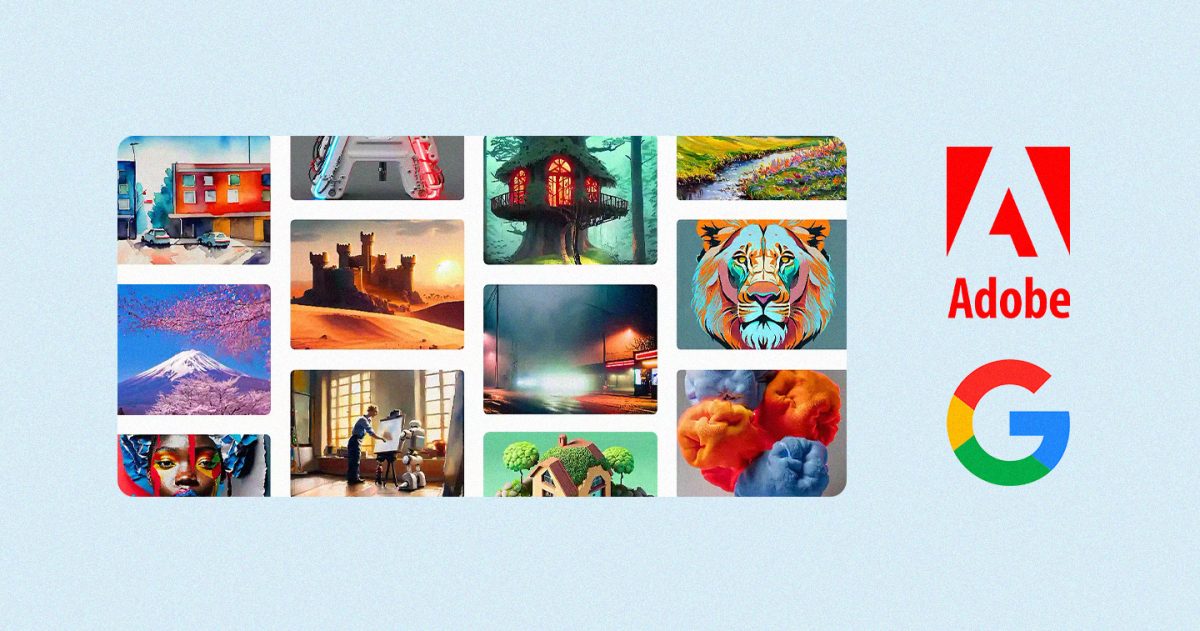SINGAPORE — Adobe recently showcased the incredible momentum of Adobe Firefly including a new integration with Bard by Google and the expansion of the Content Authenticity Initiative. In the first month since Adobe’s Firefly beta launch, creators made it one of the company’s most successful betas ever and generated more than 70 million images with capabilities such as text-to-image, vector re-coloring, and text effects, with more coming in the weeks ahead. Adobe developed Firefly, a new family of creative generative AI models, with its AI ethics principles of accountability, responsibility, and transparency, enabling Firefly models to be both creator-focused and safe for commercial use.
Adobe and Google are partnering to bring Firefly to Bard, Google’s experimental conversational AI service, with the ability to continue the creative journey further in Adobe Express. In the coming months, Firefly will become the premier generative AI partner for Bard, powering and highlighting text-to-image capabilities. With the new Bard by Google integration, users at all skill levels will be able to describe their vision to Bard in their own words to create Firefly-generated images directly in Bard and then modify and use them to create designs via Express.
Adobe and Google are approaching this partnership through a creator-focused lens. Adobe will use the Content Authenticity Initiative’s (CAI) open-source Content Credentials technology to bring transparency to images generated through this integration. This partnership will deliver creator-focused generative AI to millions more people.
“The incredible response to our Adobe Firefly beta demonstrates the power and potential of generative AI to inspire more people to create and the strong demand for a creator-centric, commercially viable approach,” said Ely Greenfield, CTO of Digital Media at Adobe. “We’re empowering millions more people to use Firefly for creative inspiration and design and share standout content with Adobe Express through this integration with Bard by Google.”
“Generative AI has captured the world’s attention and changed how we think about collaboration and productivity,” said Sissie Hsiao, Vice President and GM of Assistant and Bard at Google. “We’re thrilled to partner with Adobe Firefly, giving our users the power to bring their creative ideas to life, quickly and easily – directly in Bard.”
Firefly is the most differentiated generative AI service that generates commercially viable, professional quality content and is designed to be embedded directly into creators’ workflows both in Adobe’s own applications and now in Bard by Google. Firefly’s first model is trained on Adobe Stock images, openly licensed content, and public domain content where the copyright has expired. Enterprise businesses will be able to train Firefly with their own creative collateral in order to generate content in the company’s brand language. The integration of Firefly across Adobe Experience Cloud applications will allow marketing organizations to use Firefly to accelerate their content supply chain production.
“At this critical moment in history, as generative AI becomes more powerful and prevalent than ever, people need a way to tell what’s behind the content they’re consuming,” said Dana Rao, General Counsel and Chief Trust Officer at Adobe. “Content Credentials will enable creators to tell their stories authentically while providing easy-to-use tools to verify how a piece of content was created and modified.”
The CAI, which was founded by Adobe, has exceeded a significant milestone, surpassing 1,000 members with new additions to its global coalition including Universal Music Group (UMG), Stability AI, and Spawning.ai. They join a broad mix of tech and media companies, camera manufacturers, creative professionals, researchers, NGOs, and many others. With the emergence of generative AI, Content Credentials serve an essential role in ensuring people know whether a piece of content was created by a human, AI-generated or AI-edited.
“This milestone demonstrates the importance of restoring trust online and incredible momentum behind the Content Authenticity Initiative solution across every vertical and industry,” said Dana.
Content Credentials
The integration of Firefly with Bard by Google will bring Adobe’s ethically developed image creation and editing capabilities to millions of Google users who will be able to modify the images in Express and use them to create standout content with inspiration from Express’s beautiful, high-quality collection of templates, fonts, Stock images, and assets.
Express is an all-in-one content creation app that makes it fast, easy, and fun to design and share standout social media posts, videos, images, PDFs, flyers, logos, and more.
Because Firefly has the CAI’s Content Credentials on by default, every image created in Bard using Firefly will have transparency built in. The CAI’s Content Credentials is a free, open-source tool that serves as a digital “nutrition label.” Content Credentials can show information such as name, date, the tools used to create an image, and any edits made to that image. They remain associated with content wherever it is used, published, or stored, enabling proper attribution and helping consumers make informed decisions about digital content.
About Content Authenticity Initiative
Adobe created the CAI to help combat the threat of misinformation and ensure proper attribution for creators. In addition to new generative technology developers, current CAI members include AFP, the Associated Press, the BBC, Getty Images, Leica, Microsoft, Nikon, Reuters, The Wall Street Journal, and more. The CAI recognizes the enormous opportunities and challenges resulting from AI-generated content and understands the coalition’s unique role in helping consumers make informed decisions about the content they are consuming. Between the tremendous momentum in attracting new members and the growing adoption of Content Credentials by leaders spanning multiple industries, the CAI is ensuring that technological innovations are built on ethical foundations.








